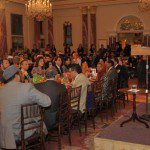 |
|
Losing patience
|
In the year 2000, a very public reconciliation took place on a Chicago stage between the leader of the Nation of Islam (NOI), Louis Farrakhan and the man who once took his place, Imam Warith Deen Muhammad. When WD Muhammad was chosen to lead the NOI after his father’s death in 1975, he moved the organization – rechristened, so to speak, as the Muslim American Society – towards orthodox Sunni Islam until a disillusioned Farrakhan resurrected the NOI in 1981, assumed the group’s leadership, and brought back much of the evangelical Black nationalist theology.
As Muslims from around the world continued to immigrate to the US and Islam eventually became a near-daily news item, comparisons with the NOI’s awkward teachings strained the credibility of the Islamic tenets the group had long co-opted (the personification of Allah in the form of the organization’s founder, W. Fard Muhammad, in particular). The meeting at the NOI’s 2000 Savior’s Day convention was an indication, in part, that a slow push towards a more conventional Islam was underway, a move propelled by the eventual dwarfing of NOI’s membership (number in the tens of thousands) compared to Muhammad’s (more than a million). At that meeting, WD Muhammad held out an olive branch to those who opposed his shift to orthodox Islam 30 years ago, and offered to educate NOI leaders in the Islam he favored.
But last week, Muhammad added harsh words to the soft pressure he had been exerting quietly since that rapprochement. “The time for those [NOI] leaders who had that hate rhetoric has come and passed,” said Muhammad last week during a speech at the University of Arkansas, “and they know it.” Indeed, many of the main points of contention between the NOI and orthodox Muslims – calls for separation of the races, bans on interracial marriage, and the deification of the NOI founder – are still featured prominently on the organization’s website. In addition to the lack of progress on discarding unorthodox teachings, Muhammad also cited the “fancy lifestyles” of NOI leaders as proof of their “having fun” at the expense of the rank-and-file membership.
Claiming knowledge of the NOI’s inner workings, Muhammad predicted that, in the absence of Farrakhan’s direct leadership (the leader, currently fighting prostate cancer, stepped down late last year), the current leaders would see the writing on the wall and take steps avoided until now. With Farrakhan’s strong personality acting as the glue that kept the NOI together in its current form, it will be difficult for the NOI to survive without a similarly strong leader who shares his viewpoints. “I think there’s a merger coming,” insists Muhammad, “a quiet merging of leaders of the Nation of Islam and leaders in my community.”
Still, the wildly divergent teachings of the Nation as compared to orthodox Islam may make such a merger a zero-sum game. If things go the way WD Muhammad predicts, it will leave steadfast believers in the teachings of Elijah and Fard Muhammad abandoned. Theology aside, the many successes of the NOI in confronting drug dealers, gang violence, and promoting paternal responsibilities (most vividly demonstrated in Farrakhan’s Million Man March in 1995) are still appreciated by many African-Americans of other religious persuasions. Any challenge to the NOI would have to go beyond theological changes and prove that it can be as galvanizing, effective, and influential in such matters – something the more sedate WD Muhammad may struggle with.
Farrakhan has thus far attempted to convey a message to mainstream Muslims that he is a true believer, while maintaining a veneration for the NOI founders that keeps its core members in check. For many Muslims, the litmus test for the transition effort remains the statement of basic tenets in the Final Call newspaper and on the NOI’s website. Like the white smoke above the Vatican that signals the selection of a new Pope to the Catholic world, outsiders to the still secretive organization will be waiting for signs of change there – signs that may yet prove the birth of a new Nation.
Shahed Amanullah is editor-in-chief of altmuslim.com.











